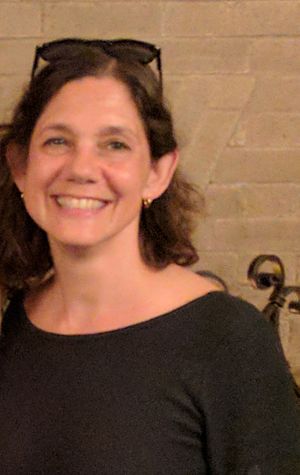Marina Picciotto facts for kids
Quick facts for kids
Marina Rachel Picciotto
|
|
|---|---|

Marina Picciotto at Yale University in 2017
|
|
| Born | June 22, 1963 Bloomington, Indiana, U.S.
|
| Alma mater | |
| Known for | Nicotinic receptors |
| Awards |
|
| Scientific career | |
| Fields | Neuroscience |
| Institutions | Yale University |
| Doctoral advisor | Paul Greengard |
| Other academic advisors | Jean-Pierre Changeux, Richard Scheller |
Marina Rachel Picciotto, born on June 22, 1963, is an American neuroscientist. Neuroscientists are scientists who study the brain and the nervous system. Dr. Picciotto is especially known for her important work on how certain parts of the brain, called nicotinic acetylcholine receptors, affect memory and how we feel rewarded.
She is a professor at Yale University School of Medicine. She works in different departments, including Psychiatry, the Child Study Center, Neuroscience, and Pharmacology. In September 2023, she became the Director of Yale University's Interdepartmental Neuroscience Program. Before that, from 2015 to 2023, she was the main editor for a major science magazine called Journal of Neuroscience. She is also currently the President of the Society for Neuroscience, which is a big group for brain scientists.
Contents
Her Journey in Science
Marina Picciotto was born in Bloomington, Indiana. When she was very young, her family moved to New York City. She went to Hunter College High School and finished in 1981.
She then went to Stanford University and earned her Bachelor of Science (B.S.) degree in biology in 1985. A B.S. degree is usually the first university degree you get. Later, she earned her Doctor of Philosophy (Ph.D.) degree in 1992 from Rockefeller University. A Ph.D. is a very advanced degree that means you have done a lot of original research.
After getting her Ph.D., she moved to Paris, France. There, she did special research called post-doctoral work at the Pasteur Institute from 1992 to 1995.
Discoveries About the Brain
Dr. Picciotto started her science career studying the brain while she was still in college at Stanford University. She worked with a scientist named Richard Scheller. During this time, she found out that a specific gene creates many copies of a tiny brain chemical called a neuropeptide.
Later, for her Ph.D. work at Rockefeller University, she worked with Paul Greengard. She helped discover the gene for an important protein in the brain called calcium/calmodulin-dependent protein kinase 1.
While in Paris, working with Jean-Pierre Changeux, she made a very important discovery. She created the first "knock-out" mouse that was missing a specific part of a nicotinic receptor. Studying these special mice helps scientists understand what different parts of the brain do.
In 1995, Dr. Picciotto came back to the United States. She joined the faculty at Yale University as an assistant professor. Over the years, she became a full professor and received a special title in Psychiatry in 2008.
More recently, Dr. Picciotto's research has shown that if a baby is exposed to nicotine before birth, it can have big effects on their behavior later in life. She has shared her concerns about the use of e-cigarettes and low-dose nicotine products because of her research findings. Her work helps us understand how different things can affect brain development and behavior.
Leading the Way in Science Publishing
In 2015, Dr. Picciotto became the main editor of The Journal of Neuroscience. This is a very important science magazine where scientists publish their new discoveries about the brain.
When she took over, she made several helpful changes. For example, she stopped charging fees for scientists who are members of the Society for Neuroscience to submit their work. She also made it possible for authors to publish extra information with their papers.
Dr. Picciotto also added new rules to make sure that the scientific studies published were carefully checked for their methods and results. She also supported a new way of sharing research called "pre-print publishing." This means scientists can share their work online quickly before it's officially published in a journal. She also started thanking scientists on social media who helped review other scientists' work.
Awards and Recognitions
Dr. Picciotto has received many important awards for her work. In 2000, President Bill Clinton gave her the Presidential Early Career Award for Scientists and Engineers at the White House. This award is a big honor for young scientists.
She was also chosen as a fellow of the American Association for the Advancement of Science in 2014. In 2012, she was elected to the National Academy of Medicine, which is a very respected group of health and medicine experts.
From 2018 to 2019, Dr. Picciotto was the President of the Society for Research on Nicotine and Tobacco. In 2019, she was one of only 11 scientists to receive the National Institutes of Health’s Pioneer Award, which supports very creative research. That same year, she received the Bernice Grafstein award for helping women in neuroscience careers.
She was given the Andrew Carnegie Prize for Mind and Brain Science in 2020. In 2021, she received the Langley Award for Basic Research on Nicotine and Tobacco. Most recently, in 2024, Dr. Picciotto was welcomed into the American Academy of Arts and Sciences for her amazing work in understanding the brain.

